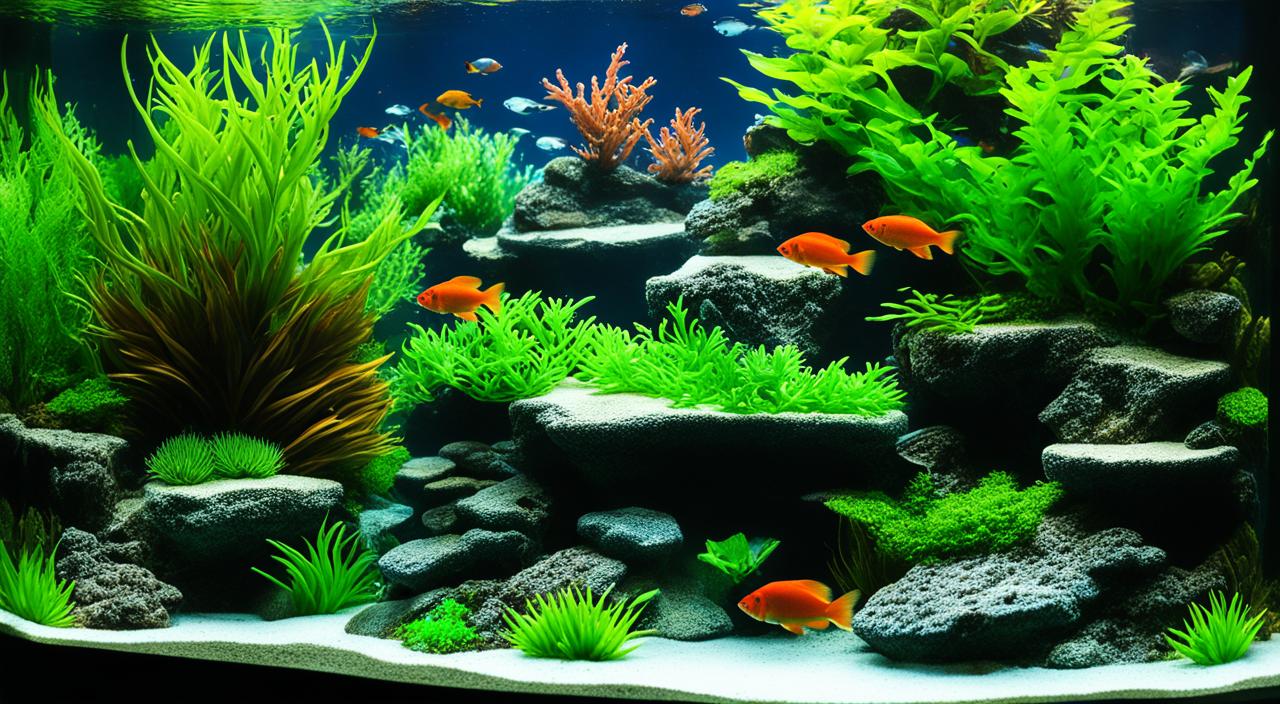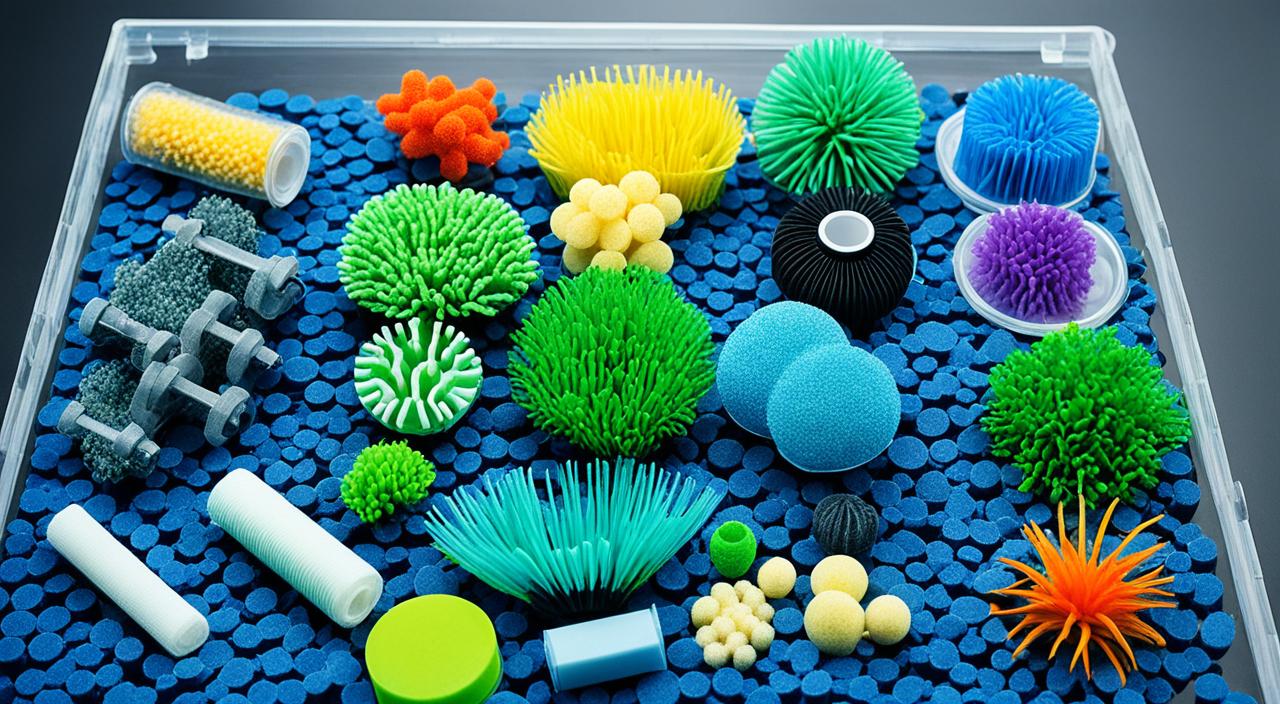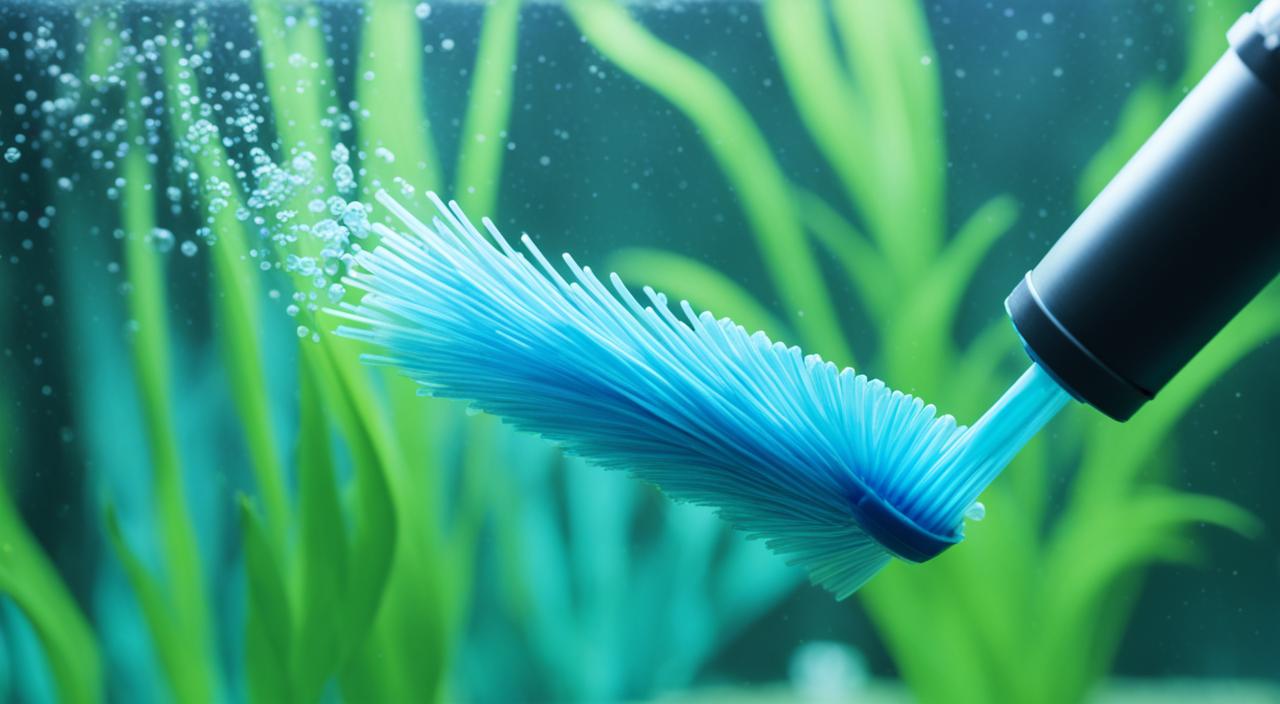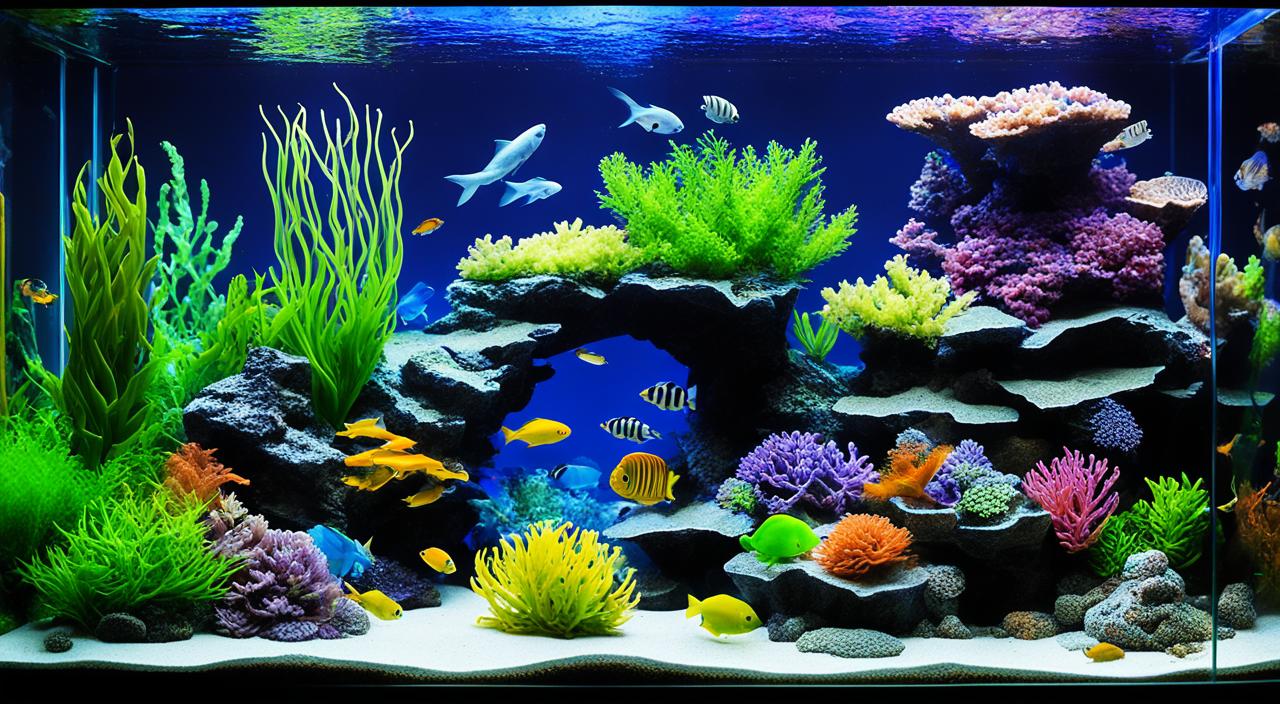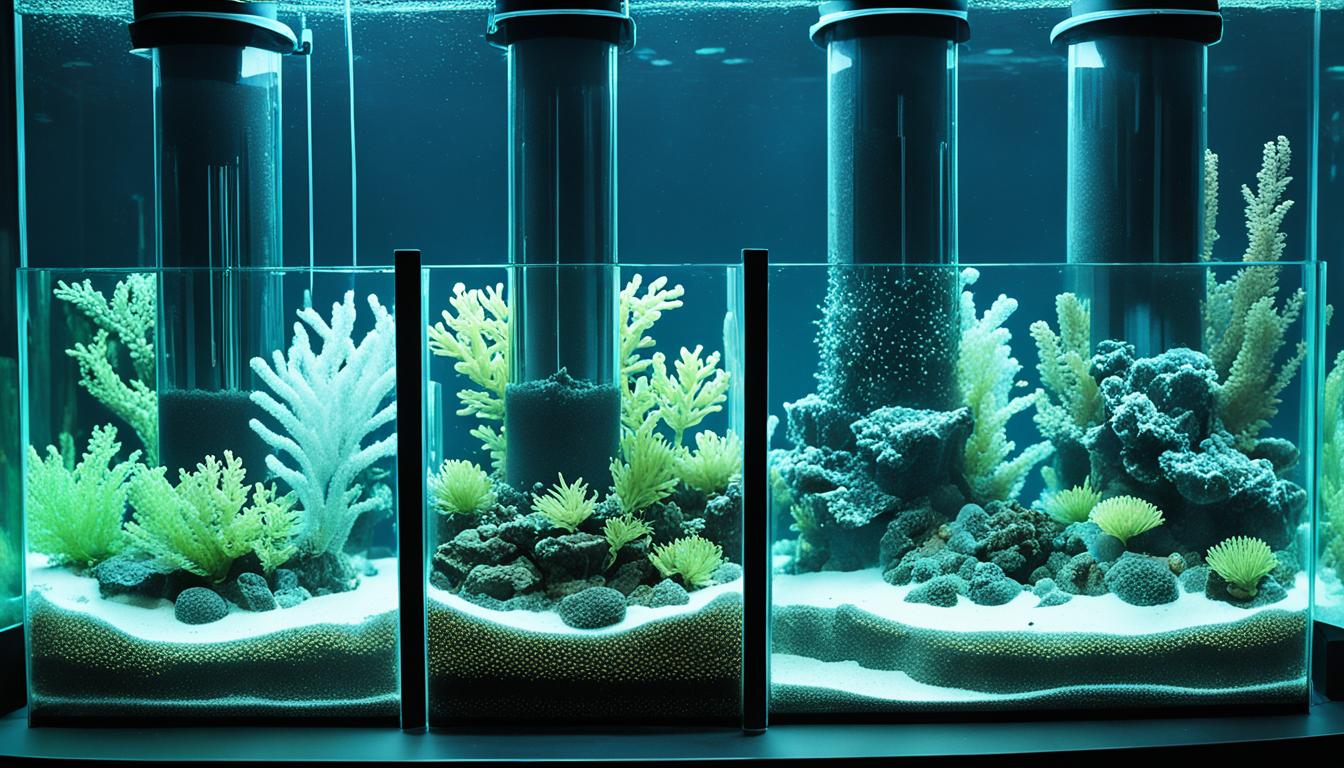Selecting the right aquarium filter is crucial when maintaining a healthy and thriving aquatic environment. Your filter choice is critical in keeping the water clean, removing waste, and providing optimal conditions for fish and aquatic plants. In this section, we will explore the factors to consider when choosing an aquarium filter, including the size and species of your tank, the type of filtration required, and your budget. By understanding these factors, you can find the perfect match for your aquarium’s needs.
Key Takeaways:
- Choosing the right aquarium filter is essential for maintaining a healthy aquatic environment.
- Consider the size and species of your tank, the type of filtration required, and your budget when selecting a filter.
- Understanding the different types of filtration—mechanical, biological, and chemical—is crucial in finding the right filter.
- Consider the specific needs of your fish and aquatic plants when selecting a filter.
- Factors such as filter lifespan, brand reliability, and maintenance ease should also be considered.
- The Essential Role of Aquarium Filters for a Healthy Aquatic Environment
- Understanding the Types of Filtration: Mechanical, Biological, and Chemical
- Selecting Based on Tank Size Consideration and Fish Species
- Choosing the Right Aquarium Filter for Aquatic Plants
- Comparing Filter Lifespan, Brand Reliability, and Maintenance Ease
- Dealing with Space Constraints, Noise Level, and Budget Considerations
- Choosing the Right Aquarium Filter: Tailored Advice for Customizable Filtration and Installation Ease
- FAQ
- Source Links
The Essential Role of Aquarium Filters for a Healthy Aquatic Environment
Aquarium filters are crucial in creating and maintaining a healthy aquatic environment. They are essential for removing waste, toxins, and harmful chemicals from the water, ensuring your fish’s and aquatic plants’ well-being. By promoting water clarity, preventing the build-up of ammonia and nitrate, and providing proper oxygenation, aquarium filters create an optimal habitat for your aquatic pets.
Water clarity is vital for the overall health of your aquarium ecosystem. A quality filter helps to eliminate debris, ensuring that your fish inhabit clean and visually appealing water. Additionally, filters play a crucial role in removing ammonia and nitrate, which can harm your fish in high concentrations. By effectively eliminating these substances, filters prevent water contamination and maintain a safe environment for aquatic pets.
Oxygenation is another essential function of aquarium filters. Fish require oxygen to survive, and the filter helps to agitate the water’s surface, allowing for the exchange of gases. Filters enable your fish to breathe easily by ensuring proper oxygenation, promoting their overall well-being.
Aquarium filters are indispensable for creating and maintaining a healthy aquatic environment. They are essential for water clarity, preventing the build-up of harmful substances, and providing proper oxygenation. By understanding filters’ vital role, you can appreciate their significance in maintaining a thriving aquarium.
Understanding the Types of Filtration: Mechanical, Biological, and Chemical
Aquarium filtration is essential for maintaining a healthy aquatic environment. Three main types of filtration work together to remove impurities and ensure optimal water quality: mechanical, biological, and chemical filtration.
How Mechanical Filtration Maintains Water Clarity
Mechanical filtration is crucial in maintaining water clarity by removing debris and suspended particles. It uses a physical barrier, such as a sponge or filter pad, to trap larger particles, preventing them from circulating in the aquarium. This type of filtration enhances water clarity, making the aquarium more visually appealing and providing a cleaner environment for your fish and plants.
Biological Filtration: Harnessing Beneficial Bacteria
Biological filtration utilizes beneficial bacteria to break down harmful substances in the water, such as ammonia and nitrate. These bacteria colonize the filter media and surfaces within the aquarium, converting toxic compounds into less harmful substances through a process called nitrification. This type of filtration is crucial for maintaining a stable nitrogen cycle and ensuring the overall health of your aquarium’s inhabitants. Beneficial bacteria promote water quality and create a biologically balanced ecosystem.
The Purpose of Chemical Filtration in Aquariums
Chemical filtration involves using substances like activated carbon or specialized resins to remove impurities and treat the water. It targets dissolved organic matter, toxins, and other chemical compounds that cannot be removed through mechanical or biological filtration alone. Chemical filtration effectively eliminates odours, discolouration, and harmful pollutants, resulting in a cleaner and safer aquatic environment. It is an essential component of water treatment in aquariums, helping to maintain pristine water quality and ensuring the well-being of your fish and plants.
Selecting Based on Tank Size Consideration and Fish Species
When selecting the right aquarium filter, it’s essential to consider the size of your tank and the species of fish you have. These factors play a crucial role in determining the filtration requirements for your aquarium. Different tank sizes require different filtration capacities, and certain fish species may have specific water flow and oxygenation needs. By understanding these considerations, you can ensure that your aquarium filter suits your tank and its inhabitants.
Firstly, let’s talk about tank size. Selecting an aquarium filter that can handle the water volume in your tank is important. Larger tanks typically require filters with higher flow rates and larger media capacities to remove waste and maintain water quality effectively. On the other hand, smaller tanks may have more specific filtration needs due to limited space.
Secondly, the fish species in your tank will also impact your filtration requirements. Fish species produce varying amounts of waste and have distinct preferences for water flow and oxygen levels. For example, some fish, like bettas, prefer calmer water with minimal flow, while others, like goldfish, thrive in tanks with solid filtration and increased oxygenation.
By understanding the specific needs of your tank size and fish species, you can select an aquarium filter that meets the filtration requirements of your aquatic environment. Consider factors such as flow rate, media capacity, and adjustability to ensure that the filter provides optimal water quality for your fish and plants.
| Tank Size | Fish Species | Filtration Requirements |
|---|---|---|
| Small tank ( | Betta fish, small tropical fish | Compact and adjustable filter with minimal flow |
| Medium tank (10-30 gallons) | Community fish, medium-sized tropical fish | Medium-sized filter with moderate flow and adjustable settings |
| Large tank (>30 gallons) | Goldfish, cichlids, large tropical fish | Goldfish, cichlids, sizeable tropical fish |
Remember, selecting the right aquarium filter based on tank size and fish species is crucial for maintaining a healthy and balanced aquatic environment. Proper filtration can ensure the well-being of your fish and create a thriving ecosystem in your aquarium.
Choosing the Right Aquarium Filter for Aquatic Plants
If aquatic plants are in your aquarium, selecting the right filter is essential for their growth and health. Aquatic plants have unique needs regarding water flow, nutrient levels, and chemical composition. By choosing the right filter, you can create an environment that supports the growth of vibrant and thriving aquatic plants.
When it comes to aquarium filters for aquatic plants, there are a few options that are particularly well-suited for plant filtration:
- Canister Filters: Filters are highly efficient and provide excellent mechanical and biological filtration. They are ideal for larger aquariums and offer customizable media options, allowing you to tailor the filtration process to meet the specific needs of your aquatic plants.
- Hang-On-Back (HOB) Filters: HOB filters are popular among aquarium enthusiasts due to their ease of use and effectiveness. They provide mechanical and biological filtration and can be easily adjusted to accommodate the needs of your aquatic plants.
- Sponge Filters: Sponge filters are a gentle and effective option for smaller aquariums or tanks with delicate aquatic plants. They provide biological filtration and are known for their ability to foster the growth of beneficial bacteria, which is crucial for maintaining a healthy environment for your plants.
Choosing the right filter for your aquatic plants involves considering factors such as the size of your aquarium, the specific needs of your plants, and your budget. It’s essential to ensure that the filter you select provides adequate water flow and sufficient nutrient levels for your plants to thrive.
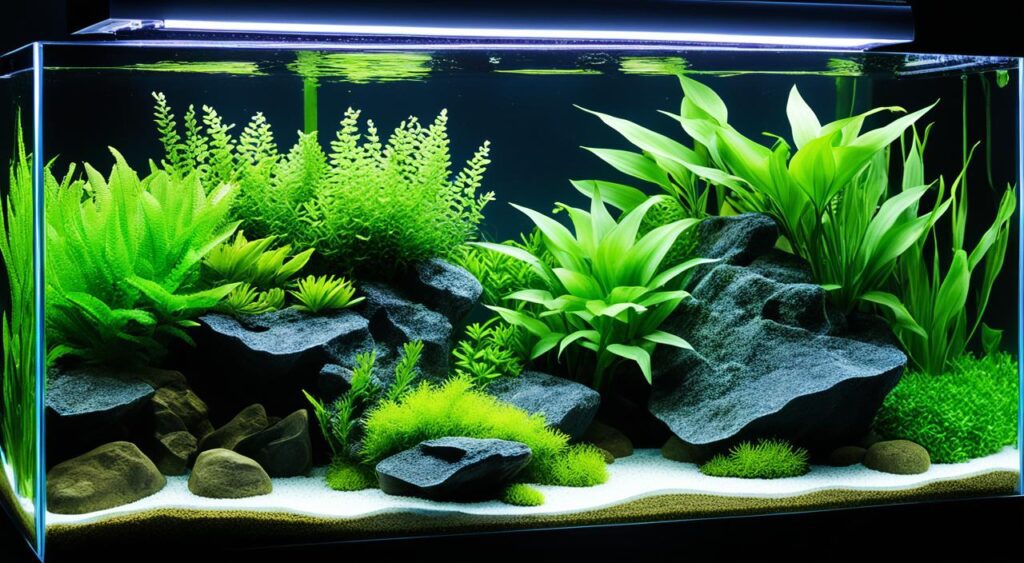
Comparing Filter Lifespan, Brand Reliability, and Maintenance Ease
When choosing an aquarium filter, several factors can affect your overall aquarium maintenance experience. These factors include the filter lifespan, brand reliability, and maintenance ease. By carefully evaluating these aspects, you can ensure you select a filter that provides longevity, reliability, and ease of maintenance.
What to Expect from Different Filter Lifespans
The filter lifespan refers to the duration a filter can effectively function before it needs replacement. Different filters have varying lifespans depending on their design, features, and the frequency of maintenance. Some filters may need replacement every few months, while others can last up to a year or more.
When determining the appropriate filter lifespan for your aquarium, consider factors such as the size of your tank, the number and size of fish, and the amount of waste produced. It’s also essential to follow the manufacturer’s recommendations and regularly maintain and clean the filter to ensure longevity.
Evaluating Aquarium Filter Brands for Reliability
Brand reliability plays a vital role in ensuring the quality and performance of your aquarium filter. Trusted brands are known for their commitment to producing reliable and durable filters that meet the filtration needs of aquarium enthusiasts.
When evaluating aquarium filter brands for reliability, consider factors such as the brand’s reputation in the aquatics industry, positive customer reviews and feedback, and the brand’s longevity in the market. It’s also beneficial to consult with experienced fishkeepers or aquarium forums to gather insights and recommendations on reputable brands.
Simplifying Your Routine with Easy-to-Maintain Filters
Easy-to-maintain filters can significantly simplify your aquarium maintenance routine, making the process more efficient and enjoyable. These filters have user-friendly features that facilitate easy cleaning, media replacement, and overall maintenance.
When selecting an easy-to-maintain filter, look for features such as self-priming mechanisms, quick-disconnect valves, and easily accessible filter media compartments. These features can save you time and effort when performing routine maintenance tasks. It’s also essential to follow the manufacturer’s instructions and recommended maintenance schedule to ensure optimal performance and longevity of the filter.
By considering the filter lifespan, brand reliability, and maintenance ease, you can select an aquarium filter that aligns with your needs, enhances the health and well-being of your aquatic environment, and provides an enjoyable fishkeeping experience.
Dealing with Space Constraints, Noise Level, and Budget Considerations
In some cases, space constraints, noise level, and budget considerations may influence your choice of aquarium filter. It’s crucial to find a filter that not only meets your aquarium’s filtration needs but also seamlessly fits into your specific circumstances. This section will explore strategies to help you navigate these factors and make an informed decision.
Space Constraints
When working with limited space, choosing a compact filter that doesn’t take up too much room in your aquarium setup is crucial. Compact filters are designed to be space-saving while still providing effective filtration. Look for filters that can be installed in confined areas or have a slim profile, ensuring they won’t overwhelm your tank.
Additionally, consider the placement options for your filter. Some filters can be positioned vertically, horizontally, or even on the tank’s back. This flexibility allows you to adapt to your spatial limitations and find the best fit for your aquarium.
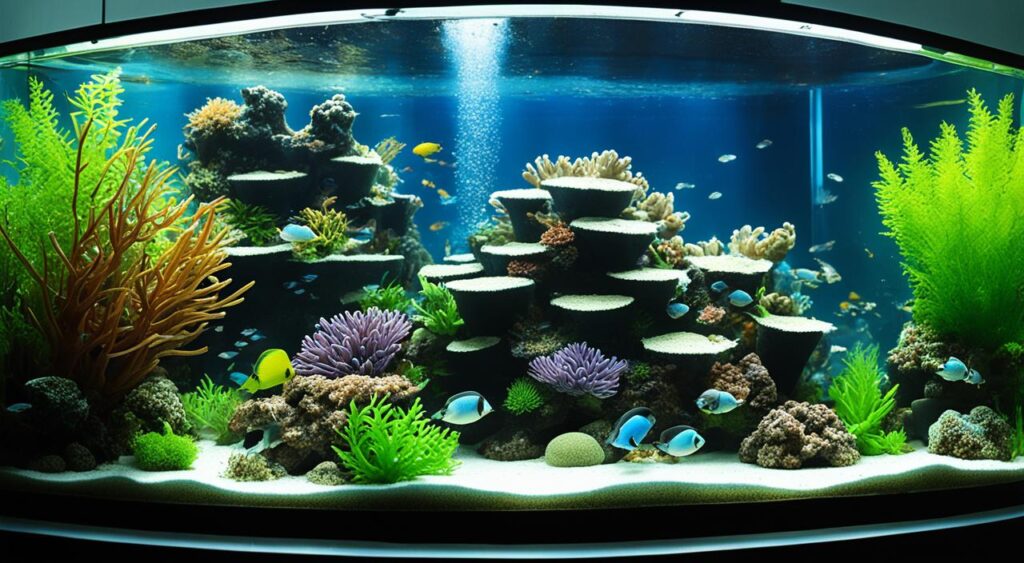
Noise Level
For many aquarium enthusiasts, a peaceful and quiet environment is essential. If noise from the filter motor or water flow is a concern, opt for filters designed to operate quietly. Look for models with noise-reducing features such as sound-dampening materials or adjustable flow settings.
Consider the distance between your aquarium and your living spaces or work areas. Placing soft materials or foam pads under the filter can absorb vibrations and reduce noise. Ensuring a quiet filtration system will enhance your overall experience and prevent disturbances caused by excess noise.
Budget Considerations
When selecting an aquarium filter, budget considerations are important. Filters are available at a range of price points, so it’s crucial to assess your budget and find a filter that offers both affordability and filtration efficiency.
While budget-friendly filters may have basic features, they can still effectively meet your aquarium’s filtration needs. Look for filters with durable construction and reliable performance that offer good value for money. Reading product reviews and comparing prices can also help you find the best deal without compromising quality.
By carefully considering space constraints, noise levels, and budget considerations, you can choose an aquarium filter that meets your needs and creates an optimal aquatic environment for your fish and plants.
Dive Deeper into the World of Aquarium Filtration
Our journey through the fundamentals of aquarium filters is just the beginning. Delve deeper with us as we explore each facet of aquarium filtration in our upcoming series:
- Types of Aquarium Filters: Discover the diverse world of filters and find the perfect match for your aquatic setup.
- The foundation of Filtration: The Three Pillars of Filtration(Biological, Mechanical and Chemical)
- Aquarium Filter Brands: Navigate the seas of options as we review the top brands in the filtration market.
- Aquarium Filter Accessories: Uncover the essential additions that enhance filtration efficiency and effectiveness.
- Aquarium Filters by Tank Type: Learn how to select the ideal filter for your specific tank type, whether freshwater, marine or a specialized setup.
- Aquarium Filter Setup and Usage: Step-by-step guidance on installing your filter and optimizing its performance.
- Aquarium Filter Maintenance: Keep your aquatic environment pristine with our tips on regular filter care and troubleshooting.
- Aquarium Filter Performance: Evaluate filter performance and ensure your aquatic residents thrive in a clean, healthy environment.
- Specialized Aquarium Filters: Explore filters designed for unique challenges, including breeding tanks and heavily planted aquariums.
- Aquarium Filter Sales: Find the best deals and make informed purchases with our buying tips and recommendations.
- Innovations in Aquarium Filters: Stay ahead of the curve with the latest advancements in filtration technology.
Embark on a Clearer Path to Aquatic Excellence
Your quest for the perfect aquatic ecosystem is a journey we’re excited to share. Each article in our series is designed to illuminate, guide, and inspire. Don’t miss out on turning your aquarium into a thriving, vibrant underwater paradise.
Choosing the Right Aquarium Filter: Tailored Advice for Customizable Filtration and Installation Ease
Customization and ease of installation are key factors when selecting the right aquarium filter. By choosing a filter with customizable filtration options, you can maximize filtration efficiency and cater to your aquarium’s specific needs. These filters allow you to adjust the filtration process, ensuring that your tank receives the optimum level of filtration for cleaner and healthier water.
Maximizing Filtration Efficiency with Customizable Options
Customizable filters offer a range of filtration options, allowing you to tailor the process to match the requirements of your aquarium. By selecting a filter with customizable options, you can adjust the flow rate, media type, and filtration stages to accommodate the specific needs of your fish and aquatic plants. This level of customization ensures that your filter works efficiently and effectively, providing optimal conditions for your aquatic ecosystem.
Ensuring Smooth Setup with Filters Designed for Easy Installation
Installing an aquarium filter shouldn’t be a complex or time-consuming process. Fortunately, there are filters available that are specifically designed for easy installation. These filters feature user-friendly designs with intuitive interfaces and clear instructions, making the setup process a breeze. By choosing an easy installation filter, you can save time and effort, allowing you to focus on enjoying your aquarium rather than struggling with complex installations.
When selecting an aquarium filter, it’s essential to consider customizable filtration options and installation ease. By opting for a customised filter, you can maximize filtration efficiency and target the specific needs of your aquarium. Choosing a filter with accessible installation features also ensures a smooth and hassle-free setup process. By considering these factors, you can select the right aquarium filter that provides both efficiency and ease of use for your aquatic environment.

